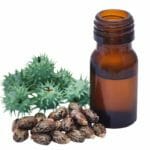11 Best natural oils for hair
At BeautyCaters, our expert team independently curates every recommended product. Purchases through our links may earn us a commission. Explore our transparent selection process.
Tired of dry, dull, or lifeless hair? Nature’s bounty offers a treasure trove of oils that can transform your tresses. From coconut to argan, these natural elixirs can nourish, repair, and revitalize your hair. Let’s explore the 11 best natural oils for hair that unleash your tresses’ full potential.

11 best natural oils for hair
1. Coconut Oil: A cornerstone of hair repair

Coconut oil has become a staple in many hair care routines, and for good reason. Packed with lauric acid, this unique fatty acid has the ability to penetrate the hair shaft, a feat many other oils cannot achieve. By reducing protein loss and providing deep hydration, coconut oil is a game-changer for damaged hair. Its versatility makes it suitable for all hair types, but it truly shines when it comes to restoring life to dry, brittle strands.
2. Olive Oil: Best hair conditioner

Olive oil, a staple in Mediterranean cuisine, is equally renowned for its hair-conditioning properties. Rich in monounsaturated fats, this golden elixir effortlessly penetrates the hair shaft, delivering deep hydration and nourishment. By creating a protective barrier around the hair cuticle, olive oil helps to lock in moisture, preventing dryness and frizz.
Ideal for combating the drying effects of winter weather, olive oil adds a lustrous shine and improves manageability. Its ability to smooth the hair cuticle also helps to define curls, making it a valuable asset for curly-haired individuals.
3. Argan Oil: A savior for dyed hair

Argan oil, sourced from the kernels of the Moroccan argan tree, has emerged as a popular choice for those with damaged hair. Its exceptional ability to nourish and protect hair has made it a staple in many hair care routines.
Particularly beneficial for color-treated hair, argan oil’s rich content of essential fatty acids helps to counteract the drying effects of chemical dyes. By restoring moisture and sealing the hair cuticle, it prevents further damage and color fading, preserving the vibrancy and longevity of your hair color.
4. Jojoba Oil: A boon for thinning hair

Jojoba oil, derived from the seeds of the Simmondsia chinensis plant, has gained recognition as a valuable asset for hair care. Its unique composition, rich in liquid wax esters and essential fatty acids, offers several benefits for hair health.
Beyond its moisturizing properties, jojoba oil has demonstrated potential in addressing hair thinning. By penetrating the hair follicle and reducing protein loss, it helps to strengthen and thicken the hair shaft. Additionally, its ability to regulate sebum production contributes to a healthier scalp environment, promoting optimal hair growth.
5. Avocado Oil: Nature’s hair smoother

Avocado oil, extracted from the creamy flesh of the avocado fruit, is a treasure trove of nutrients beneficial for hair health. Rich in vitamin E and essential fatty acids, it offers exceptional moisturizing and smoothing properties.
By sealing the hair cuticle, avocado oil helps to reduce frizz, enhance shine, and prevent breakage. While its direct impact on hair loss prevention is still under investigation, its ability to improve overall hair condition and protect against damage makes it a valuable addition to any hair care routine.
6. Sweet Almond Oil: A versatile hair protector

Sweet almond oil, known for its lightweight texture, is a gentle yet effective option for various hair concerns. Its ability to moisturize without weighing down the hair makes it suitable for different hair types.
Beyond hydration, sweet almond oil offers protection against the harmful effects of UV radiation. By shielding the hair from sun damage, it helps to maintain color vibrancy, prevent dryness, and preserve overall hair health.
7. Grapeseed Oil: The ultimate frizz fighter

Grapeseed oil, a lightweight and non-greasy option, has garnered praise for its ability to tame frizz and repair split ends. Packed with antioxidants and essential fatty acids, it penetrates the hair shaft, delivering deep hydration and smoothing the hair cuticle.
By sealing the hair’s outer layer, grapeseed oil helps to prevent moisture loss, reducing frizz and flyaways. Its lightweight texture makes it ideal for fine or oily hair, as it won’t weigh down the strands. Regular use can significantly improve hair manageability and overall appearance.
Also Read: Is soybean oil good for hair?
Macadamia Nut Oil: Tame unruly hair

Macadamia nut oil, renowned for its luxurious texture and rich nutrient profile, is a game-changer for those with thick, unruly hair. Its ability to deeply penetrate the hair shaft, similar to the skin’s natural oils, makes it an exceptional moisturizer.
By smoothing the hair cuticle and reducing friction, macadamia nut oil helps to detangle and tame even the most stubborn locks. This makes it an invaluable tool for those with curly or wavy hair, as it helps to define curls and reduce frizz without weighing down the hair.
Baobab Oil: A curly hair game-changer
Baobab oil, a lesser-known gem in the world of hair care, has garnered attention for its exceptional benefits for curly hair. Derived from the African baobab tree, this oil is rich in nutrients that nourish and revitalize curls.
Its lightweight yet deeply penetrating properties allow it to hydrate and strengthen hair without weighing it down. By sealing the hair cuticle and preventing moisture loss, baobab oil helps to define curls, reduce frizz, and enhance overall hair elasticity.
Rosemary Oil: A potential hair growth stimulant

Rosemary oil has garnered significant attention for its potential to promote hair growth. A notable study comparing rosemary oil to minoxidil, a common hair loss treatment, found comparable results in increasing hair count after six months. While the exact mechanism behind this effect is not fully understood, rosemary oil’s ability to stimulate hair growth is a promising development.
Note that while research is encouraging, individual results may vary. Consistent use and patience are key when incorporating rosemary oil into a hair care regimen aimed at promoting hair growth
Tea Tree Oil: A natural remedy for dandruff

Tea tree oil, derived from the Australian Melaleuca alternifolia plant, has gained popularity as a natural solution for dandruff. Its potent antimicrobial and anti-inflammatory properties effectively combat the yeast-like fungus responsible for dandruff, known as Malassezia. By inhibiting the growth of this microorganism, tea tree oil helps to reduce flakiness, itching, and scalp irritation associated with dandruff.
How to use natural oil for hair?
To harness the benefits of natural oils, consider these application methods:
- Enrich your shampoo and conditioner: Enhance your existing hair care products by adding a few drops of your chosen oil to your shampoo or conditioner for an extra boost of nourishment.
- Targeted treatment: Apply a small amount of oil directly to the ends of damp hair to seal split ends and prevent breakage.
- Hot oil treatment: Warm up a tablespoon or two of oil and massage it into your scalp and hair. Cover with a shower cap and leave for 30 minutes before rinsing.
Remember, the ideal application method depends on your hair type and specific needs. Experiment with different techniques to find what works best for you.
Benefits of oiling hair

Hair oiling is an age-old practice that has been revered for its ability to nourish, protect, and revitalize the hair. By incorporating hair oiling into your routine, you can unlock a multitude of benefits for your tresses.
- Strengthens hair: Regular oiling helps to remove product buildup and impurities, creating a clean and healthy scalp environment. This, combined with the nourishing properties of the oil, strengthens hair follicles and reduces breakage.
- Protects hair from damage: Hair oil acts as a protective barrier, shielding your hair from the harmful effects of environmental stressors, heat styling, and pollution. This helps to maintain hair’s natural elasticity and prevent split ends.
- Boosts hair growth: Massaging your scalp while oiling stimulates blood circulation, which can promote hair growth by delivering essential nutrients to the hair follicles.
- Hydrates and nourishes: Hair oils are packed with essential fatty acids and vitamins that deeply penetrate the hair shaft, restoring moisture and preventing dryness. This leads to softer, smoother, and more manageable hair.
- Scalp health: Regular oiling can help to soothe an itchy scalp and reduce dandruff by balancing the scalp’s natural oils.
- Lice prevention: A healthy and hydrated scalp is less prone to lice infestation.
Selection of the right oil for your hair type and incorporating it into your hair care routine, you can experience the transformative benefits of hair oiling.
How to choose hair oil for your hair?

Selection of the perfect hair oil involves a careful consideration of several factors:
- Hair type: Understanding your hair’s natural texture is crucial. Fine hair benefits from lightweight oils like jojoba or argan, while thick, dry hair thrives with richer options like coconut or olive oil.
- Scalp condition: Assess your scalp’s health to determine the type of oil that will best address your needs. For oily scalps, opt for lighter oils, while dry or flaky scalps may benefit from more nourishing options.
- Hair concerns: Identify your specific hair goals, whether it’s promoting growth, reducing frizz, or repairing damage. Different oils excel in addressing various concerns.
- Ingredient analysis: Carefully examine the oil’s ingredient list to ensure it aligns with your preferences and avoids any potential allergens. Look for natural, cold-pressed oils without harmful additives.
Consideration of these factors and experimenting with different oils, you can discover the perfect formula to transform your hair.
Frequently Asked Questions about hair oils
Can I mix different hair oils?
Yes, you can mix different hair oils. Combining oils with complementary properties can create a customized blend to address specific hair concerns. For example, mixing argan oil and jojoba oil can provide both hydration and lightweight nourishment.
How often should I apply hair oil?
The frequency of hair oiling depends on your hair type and condition. Generally, applying hair oil once or twice a week is sufficient. However, those with extremely dry or damaged hair may benefit from more frequent applications.
Can I leave hair oil in overnight?
Yes, leaving hair oil in overnight can enhance its benefits. It allows for deeper penetration and more intensive nourishment. To protect your bedding, wrap your hair in a towel or use a shower cap.
Should I warm the hair oil before applying it?
While warming the hair oil can slightly enhance its absorption, it’s not strictly necessary. Room temperature oil is equally effective.
Can hair oil replace conditioner?
Hair oil and conditioner serve different purposes. While both provide moisture, conditioners offer additional benefits like detangling and smoothing. It’s best to use both products for optimal hair health.
How long does it take to see results from using hair oil?
The timeline for noticeable results varies depending on the individual and the specific hair concern. However, with consistent use, you can expect to see improvements in hair health and appearance within a few weeks.
Final Word: Best natural oils for hair
Nature’s bounty offers a wealth of hair care solutions, and natural oils stand out as powerful allies in your quest for healthy, lustrous locks. By understanding your hair type, addressing specific concerns, and carefully selecting the right oil, you can unlock your hair’s full potential. Remember, consistency is key when incorporating natural oils into your hair care routine. With patience and dedication, you’ll be well on your way to achieving the hair of your dreams.










